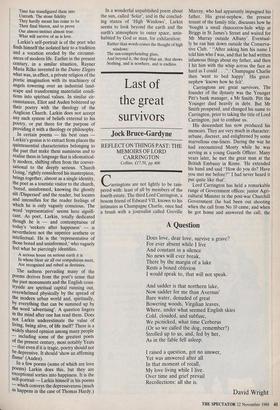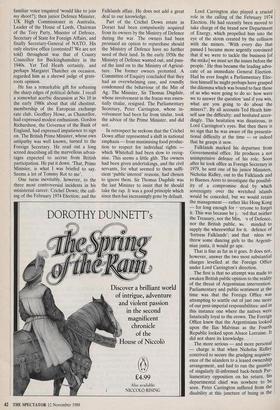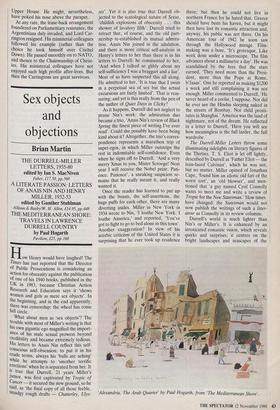Last of the great survivors
Jock Bruce-Gardyne
REFLECT ON THINGS PAST: THE MEMOIRS OF LORD CARRINGTON
Collins, £17.50, pp.400
Carringtons are not lightly to be tam- pered with: least of all by members of the fourth estate. The third Lord Carrington, a bosom friend of Edward VII, known to his intimates as Champagne Charlie, once had a brush with a journalist called Greville Murray, who had apparently impugned his father. His great-nephew, the present tenant of the family title, discusses how he 'bought a small rhinoceros-hide whip at Briggs in St James's Street and waited for Mr Murray outside Albany'. Eventual- ly he ran him down outside the Conserva- tive Club. "After asking him his name I told him who I was, and that he had written infamous things about my father, and then I hit him with the whip across the face as hard as I could. . .".' Champagne Charlie then 'went to bed happy'. His great- nephew 'knows how he felt'.
Carringtons are great survivors. The founder of the dynasty was the Younger Pitt's bank manager, a Mr Smith. Pitt the Younger died heavily in debt. But Mr Smith prospered, and changed his name to Carrington, prior to taking the title of Lord Carrington, just to confuse us.
His descendant has now produced his memoirs. They are very much in character: urbane, discreet, and enlightened by some marvellous one-liners. During the war he had encountered Monty while he was serving as a young Guards Officer. Many years later, he met the great man at the British Embassy in Rome. 'He extended his hand and said "How do you do? Have you met me before?" I had never heard it put quite like that'.
Lord Carrington has held a remarkable range of Government offices: junior Agri- cultural Minister in the post-war Churchill Government (he had been out shooting when the call from No 10 came, and when he got home and answered the call, the familiar voice 'enquired 'would like to join my shoot?); then junior Defence Minister, UK High Commissioner in Australia, Leader of the House of Lords, Chairman of the Tory Party, Minister of Defence, Secretary of State for Foreign Affairs, and finally Secretary-General of NATO. His only elective office (contested? We are not told) throughout was that of County Councillor for Buckinghamshire in the 1940s. Yet Ted Heath certainly, and perhaps Margaret Thatcher on occasion, regarded him as a shrewd judge of grass- roots opinion.
He has a remarkable gift for softening the sharp edges of political debate. I recall a somewhat acerbic discussion at No 10 in the early 1980s about that old chestnut, membership of the European exchange rate club. Geoffrey Howe, as Chancellor, had expressed modest enthusiasm. Gordon Richardson, the Governor of the Bank of England, had expressed impatience to sign on. The British Prime Minister, whose own antipathy was well known, turned to the Foreign Secretary. He read out a long screed describing all the marvellous advan- tages expected to accrue from British participation. He put it down. 'That, Prime Minister, is what I was briefed to say. Seems a lot of Tommy Rot to me'.
One turns inevitably, however, to the three most controversial incidents in his ministerial career: Crichel Down; the call- ing of the February 1974 Election; and the Falklands affair. He does not add a great deal to our knowledge.
Part of the Crichel Down estate in Dorset had been compulsorily acquired from its owners by the Ministry of Defence during the war. The owners had been promised an option to repurchase should the Ministry of Defence have no further need of their land. In the early 1950s the Ministry of Defence wanted out, and pass- ed the land on to the Ministry of Agricul- ture. The former owners protested. A Committee of Enquiry concluded that they had an overwhelming case, and roundly condemned the behaviour of the Min of Ag. The Minister, Sir Thomas Dugdale, whose involvement in the fracas was essen- tially titular, resigned. The Parliamentary Secretary, Peter Carrington, whose in- volvement had been far from titular, took the advice of the Prime Minister, and did not.
In retrospect he reckons that the Crichel Down affair represented a shift in national emphasis — from maximising food produc- tion to respect for individual rights — which Whitehall had been slow to recog- nise. This seems a little glib. The owners had been given undertakings, and the civil servants, for what seemed to them suffi- cient 'public interest' reasons, had chosen to ignore them. Sir Thomas Dugdale was the last Minister to insist that he should take the rap. It was a good principle which since then has increasingly gone by default. Lord Carrington also played a crucial role in the calling of the February 1974 Election. He had recently been moved to take charge of the brand new Department of Energy, which propelled him into the eye of the storm created by the collision with the miners. 'With every day that passed I became more urgently convinced that if we were to tackle the business [of the strike] we must set the issues before the people.' He thus became the leading advo- cate of an immediate General Election. Had he ever fought a Parliamentary Elec- tion himself he might perhaps have grasped the dilemma which was bound to face those of us who were going to do so: how were we to answer the question 'and if you win, what are you going to do about the miners?'. By all accounts Ted Heath him- self saw the difficulty: and hesitated accor- dingly. This hesitation was disastrous, in Lord Carrington's eyes. But then there is no sign that he was aware of the presenta- tional difficulty at the time — or indeed that he grasps it now.
Falklands marked his departure from Governmental office. He produces a not unimpressive defence of his role. Soon after he took office as Foreign Secretary in 1979, he sent one of his junior Ministers, Nicholas Ridley, out to the Falklands and to Buenos Aires to investigate the possibil- ity of a compromise deal by which sovereignty over the wretched islands would be conceded, but we would retain the management — rather like Hong Kong — for long enough for r Tryone to forget it. This was because he j, led that neither the Treasury, nor the Min, -1/ of Defence, nor the British public, wt minded to supply the wherewithal for tL defence of 'fortress Falklands': and that nless we threw some dancing girls to the Argenti- nian junta, it would go ape.
That is fine as far as it goes. It does not, however, answer the two most substantial charges levelled at the Foreign Office under Lord Carrington's direction.
The first is that no attempt was made to awaken British public opinion to the reality of the threat of Argentinian intervention. Parliamentary and public sentiment at the time was that the Foreign Office was attempting to scuttle out of just one more of our post-imperial responsibilities: and in this instance one where the natives were fanatically loyal to the crown. The Foreign Office knew that the Argentinians looked upon the has Malvinas as the Fourth Republic looked upon Alsace Lorraine. It did not share its knowledge. The more serious — and more personal — charge is that when Nicholas Ridley contrived to secure the grudging acquiesc- ence of the islanders to a leased ownership arrangement, and had to run the gauntlet of singularly ill-informed back-bench Par.' liamentary opposition on his return, his departmental chief was nowhere to be seen. Peter Carrington suffered from the disability at this juncture of being in the Upper House. He might, nevertheless, have poked his nose above the parapet.
At any rate, the lease-back arrangement foundered on Parliamentary resistance, the Argentinians duly invaded, and Lord Car- rington resigned. His ministerial colleagues followed his example (rather than the choice he took himself over Crichel Down). He passed smoothly on to NATO, and thence to the Chairmanship of Christ- ies. His ministerial colleagues have not enjoyed such high profile after-lives. But then the Carringtons are great survivors.












































































 Previous page
Previous page